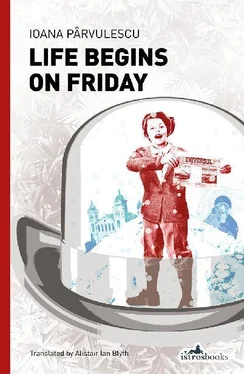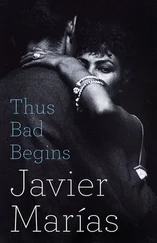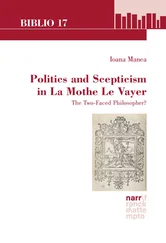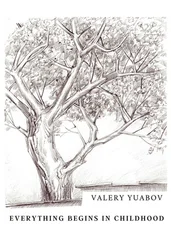Naturally, there was also the icon in the Icoanei Church, which was also to cure the sick, above all the sicknesses of the soul. As for the Virgin Mary at Sărindar, the church that Nicu Filipescu decided to demolish when he was mayor, this was the most beautiful, the most famous; she had diamond stars on her shoulders, said Grandmother, but Nicu had not seen it and did not know where it might be now or what it might be good for, because he only had use for icons as salves or medicines. On the other hand, he thought that if the man whose first name, Nicu, he shared was now being punished by God and might even go to prison for killing Bucharest’s best journalist, then it was because he had allowed the church to be demolished, rather than repairing it. That was what people said, it was also what old man Cercel said, and in the present case he himself was of the exact same opinion. Every day, he passed the site where the church had stood, on his way to Universul , and every day he felt sorry for it. Last year, they had built a fancy fountain there, just because Franz Josef was visiting, and now there was nothing but an empty space.
*
His grandmother’s grave was covered with snow, like a mound. With his hand Nicu traced a cross in the snow and wrote in large letters, slightly sloping to the left: ‘I AM WELL, NICU.’ Then he took the cow out of his pocket, showed it to the white mound, and left. The bells had chimed noon some time ago, and the boy decided, because the weather was fine and he felt his soul to be at peace, to go Cișmigiu Park. It was Sunday, and so it was not fitting to work, which is to say, to look for the wallet with the lottery ticket. If the weather allowed, there would be skating on Cișmigiu Lake. No longer ago than the previous year, from the edge of the lake he had seen Princess Maria skating, holding hands with her husband. She was beautiful and seemed so slender, even though she wearing a thick jacket, and her skirts almost swept the ice. Nicu looked especially at her dark green hat, with bows and feathers that blew back as she skated forward. The prince was in uniform, belted at the waist and with a rigid cap, like Nicu’s, but with gold braid. In the middle of the ice, next to the flagpole, stood his adjutants. That was what Nicu would be when he grew up; he would become a skater or a sailor.
Pairs of skaters were beginning to arrive. The military brass band was playing in the bandstand, and the skaters tried to glide to the rhythm of the music: tra-la-la-la-la… tra-la… tra-la… tra-la-la-la-la… tra-la… tra-la. They did pirouettes, and picked up speed. One officer was skating backwards. Nicu laughed and jumped up and down when someone fell; it was too funny to see them hit the ice with their bottoms and fling their legs in the air, like beetles. The women fell more gracefully and gathered their skirts around their legs, and then Nicu did not laugh but looked to see how much leg they exposed. When the music stopped he could hear the metal scratching the hard gleam of the lake. If old man Cercel won the lottery, he would definitely give him something, and maybe he could buy himself a pair of ice skates and learn to glide forwards and backwards over the ice. When he turned his head, he thought he glimpsed Petre, who was Inger the confectioner’s coachman, on the other side of the lake. Thinking that he might find out from him something about his new friend, Dan Crețu, he ran around the rink to meet him. But before he could reach him, Petre started to walk away. So Nicu followed him, not having anything better to do. Petre had brought his sleigh, and Nicu sat down comfortably on the plank at the back, leaning against the edge of the sleigh. All the boys knew the trick: some even tied their sledges to the back and let themselves be pulled along.
Petre’s sleigh stopped in Filaret Garden. The coachman climbed down from the box and set off towards the trees, which, next to the central lane, formed a miniature forest. Near the entrance to the park there were a few people with children, out for a stroll, but the rest of the garden was deserted. Petre vanished among the trees. When the confectioner’s coachman reappeared on the lane, Nicu was still among the trees, following the footprints in the snow. He had just reached the place where the footprints had come to a stop, and was sure he would discover something mysterious. But he found nothing — Petre had merely relieved himself against the trunk of a tree, and Nicu decided to do likewise.
Liza, Costache’s little white dog, was curled up next to the fire. She was getting old, her hair was falling out, and her back hurt. She had difficulty standing up, but Costache consoled her, saying aloud: ‘Never mind, wee dove, we’ll grow old together. You ten-years-old, me five times that.’ However, he still felt very fit and healthy. Neatly arranged in the bookcase, all his catalogues were to hand, their spines inscribed with gilt letters applied by the hand of the same bookbinder. Still in his white nightshirt, decorated with convoluted blue embroidery, Mr Costache sat down in a comfortable armchair, upholstered in dark leather, and set to work. His hair, lighter in colour than the leather of the armchairs, with but few white strands, was dishevelled and needed cutting. His moustache was also awry.
Grudgingly resigned to being more of a batman and barber than an adjutant, Zaharia was no longer surprised by his master’s caprices, nor by anything in the wider world. But he had become gloomy and rather solitary, although there was a time when he had liked to laugh, sing and drink. He pined for 1877 and the War of Independence, when he and his master were young and carefree. He had forgotten the mounds of corpses and the groans of the wounded; he had forgotten the cold and the booming cannons that had left him hard of hearing ever after. Like all simple folk, he associated his own youth with better times. Drawing the velvet drapes, the sun streamed into the room, its rays hitting one of the shelves of the bookcase, lending the titles an unexpected brilliance. Without asking, Zaharai brought his master his rather modest breakfast and placed it on one of the gigogne tables. He then saw to the fire and left the room. Mr Costache paid no attention to him. Impatiently, he opened a thick tome near the end: O… P… R. R? No, the monograms were in order of surname, a idea adopted from the Police files, where it made more sense. He needed to look up O or Z. It depended whether R was a Christian name — probably Radu — or whether O too was a Christian name, but men’s first names beginning with O were rare. Oprea? Ovidiu? Oliver? No, the other variant was better, and so he went back to surnames beginning with O. Oa, Ob, Odebeanu, Odivoianu, Odobescu, Olănescu… Omn, Onn, Or, Otetelișanu, no, that was not it. It had to be Z. But under Z there were only three monograms: Zbârcea, Zătreanu, Zorilă. What then? Probably he had overlooked something. He leafed through the R’s, in the event that R might be a surname. There were fourteen names, from Racottă to Rosetti, but none in combination with O and Z or even one of the two.
He paused and took a sip of coffee. Ugh, weak! He had forgotten to tell Zaharia to put an extra spoonful in the coffee pot and to measure the water by the cup. His adjutant was an old man who was thrifty to the point of avarice and constantly subjected him to unwanted rationing. Although Costache had pointed out to him that the war finished twenty years ago, that he personally could afford it, and indeed had always been able to, Zaharia always scrimped on coffee, sugar and firewood. He made savings at the market, on water and lighting, although the only advantage of living in the centre of town was running water and electricity. It would even be hard now for Costache to live in a place without all these delights and the benefits of modern times. When he visited the Margulis family on Strada Fântânei, he could appreciate the difference; the difference in his favour, obviously. On the other hand, the constant din of the carriages had begun to weary him. He decided to take a shower before continuing his search, and so he called for his old adjutant to heat up the water in the boiler. ‘Twenty-three degrees, mind you!’ The doctors did not recommend frequent showers and advised him to use hotter water, but he neither accepted nor imparted advice. Here he differed from his friend Margulis, who nagged people as to what was and was not best, although he wagged his tongue for nothing. The hardest thing to bear is to do something stupid not on your own initiative, but on somebody else’s advice.
Читать дальше












